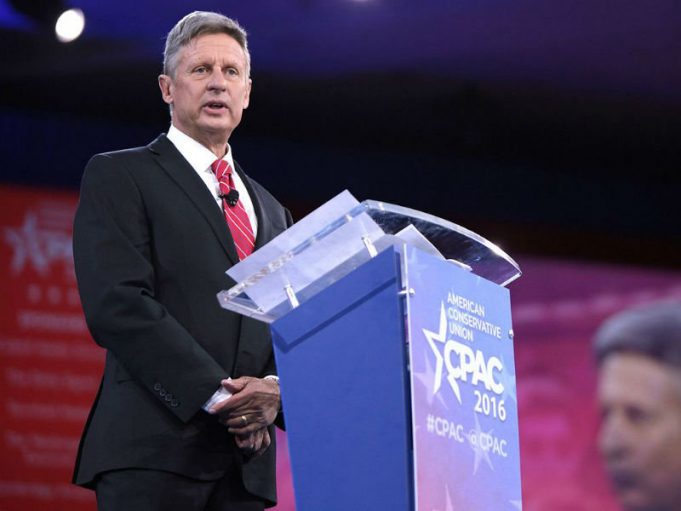I haven’t been following the presidential campaign of Libertarian candidate Gary Johnson very closely, though he sometimes scores as high as 10 or 12 percent in four-way polls against Democrat Hillary Clinton, Republican Donald Trump and Green Jill Stein.
But Twitter’s various algorithms combined to bring me a 30-second clip of Johnson on ABC’s “This Week” where he said “the future of the human race is space exploration” and that, because of global climate change, we “have to inhabit other planets.”

I wanted to give Johnson the benefit of the doubt. But the headline on the full ABC video is “Gary Johnson Calls For Space Colonization, Vows to Stay in Race.”
Even after watching the full interview, I could think of nothing, given Johnson’s history of marijuana use, other than the iconic pot-smoking scene from “Animal House.” And I shot back at Twitter, “You mean the stoner candidate is the one who’s all ‘Didja ever think about other planets, man? In the stars?'”
Turns out, though, Johnson is pretty serious. Maybe not about the science fiction, but in terms of consequences for the election.
Both pre- and post-conventions, there is data to suggest that Johnson’s presence in the race is a bigger threat to Clinton’s numbers than to Trump’s. This despite Johnson and Trump being much more ideologically aligned.
The effect Johnson is having, 538’s Harry Enten wrote in July, is relatively small, and if Clinton’s national lead is five or six points, it won’t really matter. “The discrepancy could, however, become an issue if the race becomes tighter,” he wrote – and it has, with most national polls putting the difference between Clinton and Trump at more like two points.
But presidential elections are not national elections; they’re 50 different state elections, and the state level is where Johnson could have the biggest impact. Last week’s Marquette Law School poll, the gold standard of Wisconsin polling, showed an even split – Johnson and Stein together pull the same number of voters from Trump and Clinton here. Even breaking down the data to just 18-29-year-old voters, Johnson’s millennial base (he takes 14 percent of those voters), Clinton and Trump are tied in Wisconsin in both head-to-head and in the four-way matchup.
But that’s not the case everywhere; Johnson’s polling often cuts into Clinton’s lead or widens Trump’s. And in state after state, Johnson does best with the millennial age group, a diverse group that loves President Obama and ought to be Clinton’s strongest demographic.
“A pro-pot vote for the pro-pot candidate is probably the worst thing a millennial worried about the effect the war on drugs has on non-white populations. We all know that for offenses like marijuana possession, non-whites receive far tougher sentences than whites. If racial equality and issues like Black Lives Matter really do have resonance with younger voters, they really need to rethink whatever impulse they have to vote for Gary Johnson.”
CBS News, with YouGov, has been routinely polling battleground states, and their most recent polls in Ohio, Colorado, Florida, Virginia and Pennsylvania show millennials voting for Johnson at an alarming rate. In Ohio, Johnson polls almost even with Trump among the 18-29 set, a remarkable feat for any third-party candidate in recent elections.
The reason may lie in what I joked about at the top of the column: Gary Johnson is a pro-legalization (former) pot smoker. As the probably somewhat biased website called marijuana.com noted last week, millennials of all stripes – conservative, independent and liberal – favor marijuana legalization far more than any other demographic group. Using polling data, they make the same case that I did, that Johnson is a threat to Clinton’s chances, and their proposed remedy is to adopt Johnson’s pro-pot stance.
Johnson is not making legalization the centerpiece of his campaign, but he has it in his platform and talks about it regularly while Trump and Clinton both are silent on the issue (to be inclusive, I will note that Stein also favors legalization, but she’s not polling high enough – no pun intended – to make a difference).
I am not the first to notice the danger in millennials’ abandoning Clinton for Johnson. In fact, Matt Welch at the website for Reason – the biggest Libertarian-leaning publication in the country – has thoughtfully rounded up a whole collection of people like me who think that maybe millennials are not thinking through this whole “Johnson’s pro-pot so I’m pro-Johnson” thing. Click through his links and consider their arguments; they say a lot of this better than I can.
The fact remains, though, that on almost every issue that millennials care about – from gun control to student loan relief – Johnson is on the wrong side. Even on climate change, Johnson is willing to admit it’s a thing, putting him ahead of Trump, but like most Libertarians, he wants solutions left to “the market.” His “let’s all live in space” answer on ABC Sunday kept spooling out to say nice things about the Environmental Protection Agency, but his own website trumpets free-market solutions rather than the strong government commitment millennials want on the environment.
Some of the millennial Johnson support may be a holdover from the Democratic primary. Almost all Bernie Sanders voters are happily behind Clinton at this point, but she never had strong support among the youngest voters. Millennials have no real memory of the 1990s and may not recognize that the “Crooked Hillary” Trump talks about – an image of corruption Sanders somewhat encouraged – is largely fiction and the invention of a 25-year media assault not limited to just FOX News.
So it is entirely possible that it’s not just his pro-legalization platform, but also some false equivalence pulling young voters to Johnson. Clinton and Trump are equally bad, and so there’s no reason not to vote third-party.
Because a millennial vote for Johnson is not, in fact, a vote for legalizing marijuana or for a smaller Department of Defense and military, Johnson will not win a single electoral vote. A vote for Johnson is a vote Clinton doesn’t win in the demographic group that ought to be a slam-dunk for her. It is a vote that puts states like Colorado and Ohio into toss-up territory when Obama won them easily twice.
It is a vote for Donald Trump, who has pledged to massively increase military spending and militarize our borders. His likely Attorney General, New Jersey Gov. Chris Christie, has pledged to send federal law enforcement after legal recreational and even medicinal marijuana all across the country.
One more thing to consider: Across the board, non-white voters, including non-white millennials, heavily favor Clinton. Even in states like Ohio where Trump leads overall, Clinton wins over 90 percent of African American voters. The millennials supporting Johnson then are likely to be like those I wrote about previously, white voters privileged enough to think believe their own ability to access marijuana – or cast a protest vote without personal recrimination – outweighs a sense of responsibility to others.
A pro-pot vote for the pro-pot candidate is probably the worst thing a millennial worried about the effect the war on drugs has on non-white populations. We all know that for offenses like marijuana possession, non-whites receive far tougher sentences than whites. If racial equality and issues like Black Lives Matter really do have resonance with younger voters, they really need to rethink whatever impulse they have to vote for Gary Johnson.
Their generation, after all, is the one that has the longest to live with the consequences of a Trump administration.









